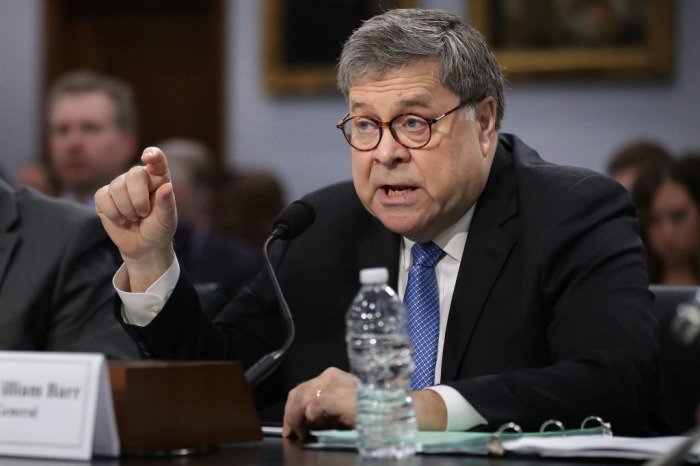Religion is ‘under siege,’ Bill Barr tells Catholics as he accepts award for ‘service in the Lord’s vineyard’

Calling it the foundation of free society, Attorney General Bill Barr said religion in America is “under siege” and urged an audience at the National Catholic Prayer Breakfast Wednesday to continue to advocate for religious liberty as he accepted an award from the group for his “service in the Lord’s vineyard.”
Barr, who is described as a “culture warrior Catholic” by the National Catholic Reporter, was the second recipient of the annual Christifideles Laici Award created by the NCPB in 2019. The award highlights the work of the lay faithful who serve the church by spreading the Gospel “in ways that are new in ardor, methods and expression” in line with Pope Saint John Paul II’s exhortation of the New Evangelization. The award reads: "In honor and gratitude for the Fidelity to the Church, Exemplary Selfless and Steadfast Service in the Lord's Vineyard."
Explaining that he was “a little sheepish” in accepting it because “no one is really worthy of an award like this,” Barr said he was honored to receive it because he admires the organizers of the annual event and those who are associated with it.
He noted that the event, which had to be online this year because of the pandemic, served as a living testament to “the vital role of the Church and its principles in American public life.” Pointing out what he said the founders of the nation understood as the crucial link between religion and liberty, Barr said this understanding has been under threat from secularists over the last five decades.
“Unfortunately, in the last half-century, that foundation of our free society has increasingly been under siege. Traditional morality has eroded, and secularists have often succeeded not only in eliminating religion from schools and the public square, but in replacing it with a new orthodoxy that is actively hostile to religion,” Barr said.
“The consequences of this hollowing out of religion have been predictably dire. Over the past 50 years, we have seen striking increases in urban violence, drug abuse, and broken families. Problems like these have fed the rise of an ever more powerful central government, one that increasingly saps individual initiative, coopts civil society, crowds out religious institutions, and ultimately reduces citizens to wards of the State,” he added.
While efforts are being taken to push back the efforts of secularists, Barr urged the faithful not to become complacent.
“As patriotic Americans and people of faith, we cannot be complacent about these trends. Yet nor should we give in to despair. More recently, thanks in part to organizations like this one, we have seen some small but significant steps toward the restoration of religion to its rightful place in American public life,” he said.
Barr then pointed to victories for religious liberty in the legal arena, citing three cases from the recent term of the Supreme Court in which the Department of Justice filed supporting briefs.
“In one case, the court reaffirmed the principle that the government cannot discriminate against religion in general funding programs, and struck down a provision of the Montana Constitution that had been interpreted to exclude religious schools from a scholarship program for underprivileged students. In another case, the court held that the First Amendment prohibits courts from intervening in employment disputes involving teachers at religious schools who are entrusted with the responsibility of instructing their students in the faith,” Barr said. “In the third case, the court considered a regulatory mandate requiring employers to provide contraceptive coverage to their employees, and upheld the administration’s rules exempting the nuns of the Little Sisters of the Poor and other employers with moral and religious objections,” he added.
Barr argued that the disputes in each case should not have even occurred because “in each case, the religious litigants were not asking for anything more than the basic freedom to exercise their faith and be treated the same as others.”
“Advocating for religious liberty is just one way that lay Catholics and others can answer the call to serve. In his exhortation Christifideles Laici, for which the award I have the honor of accepting today is named, Saint John Paul II noted that ‘the lay faithful are never to relinquish their participation in ‘public life’.’ At the same time, he emphasized that faith is first and foremost about how we live our daily lives, for ‘the daily life itself of a truly Christian family makes up the first ‘experience of Church,’” Barr said. “Whatever our vocation in life, it is never too late to work in the Lord’s vineyard. Our spiritual renewal, and the renewal of our national character, depend on it. Thank you, and God Bless America.”




























